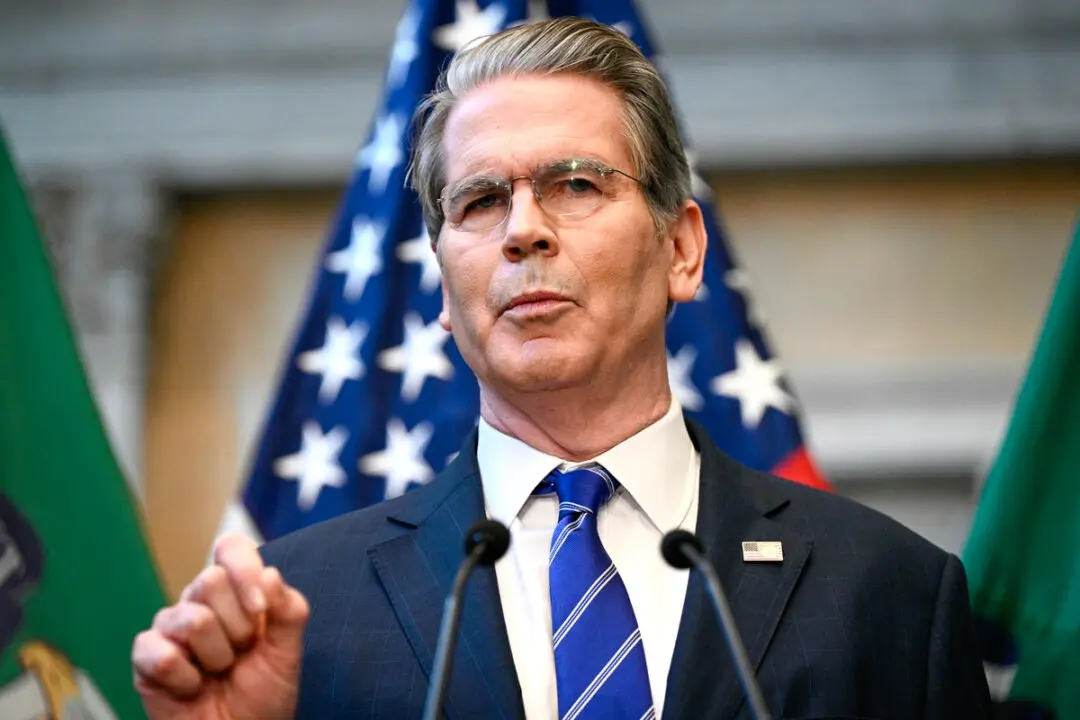‘[Trump] hasn’t put on a 10 percent tariff. He threatened to put on a 10 percent tariff,’ U.S. Treasury Secretary Scott Bessent said.

U.S. Treasury Secretary Scott Bessent speaks on the sidelines of the IMF/World Bank annual meetings in Washington, D.C., on Oct. 15, 2025. Brendan Smialowski/AFP
U.S. Treasury Secretary Scott Bessent says U.S. President Donald Trump has not yet enacted the additional 10 percent tariff on Canada he had threatened to impose in response to the Ontario government’s anti-tariff advertisement. He also said the anti-tariff television commercial featuring former U.S. President Ronald Reagan is equivalent to “election interference.”
“[Trump] hasn’t put on a 10 percent tariff. He threatened to put on a 10 percent tariff,” Bessent told CNN’s Jake Tapper on the “State of the Union” program on Nov. 2. “It hasn’t been put on yet.”
Bessent said “we’ll see” if the additional tariff will eventually be enacted, noting that he thinks the anti-tariff ad controversy was “a big setback for the Canadian government” and that Ontario Premier Doug Ford “should be ashamed” for sponsoring the ad campaign.
Trump said he was terminating all trade negotiations with Canada on Oct. 23 in response to Ontario’s $75 million ad campaign that used portions of a 1987 address to the nation by then President Ronald Reagan praising free trade, including with Canada.
Trump said the ad misrepresented Reagan’s radio address and was meant to interfere with an upcoming U.S. Supreme Court hearing on his administration’s use of tariffs.
Ford said on Oct. 24 that, following discussions with Prime Minister Mark Carney, he would pull the ad on Monday, Oct. 27, after Americans see the ads during the World Series baseball games over the weekend.
In response to Ontario not pulling the ad immediately, Trump said on Oct. 25 that he would hike tariffs on Canada by 10 percent “over and above what [Canadians] are paying now.”
While in Asia recently, from Oct. 26 to 30, with stops in Malaysia, Japan, and South Korea, Trump told reporters that he hadn’t decided when the additional tariff would take effect.
Bessent called Ontario’s ad campaign “unacceptable” and said it was comparable to “election interference.”
“I read that the Premier of Ontario spent $75 million sending propaganda across the U.S. border via our airwaves,” Bessent told Tapper.
“It’s the equivalent of election interference. Nobody likes foreign election interference. Nobody likes foreign governments trying to sway public opinion for their own good.”
Ford said one purpose of the ad was to get “Reagan Republicans” to fight with “MAGA Republicans” to stop the tariffs. He also said he wanted to get the message out to Americans that tariffs are harming workers and businesses. He said Ontario had achieved its goal, “having reached U.S. audiences at the highest levels.”
Carney Apologizes
Despite the Ontario government sponsoring the ad campaign, Trump has said he holds the Canadian government responsible for the ad because he said Carney knew about it and had seen it before it was released, which was confirmed by Ford on Oct. 27.
Meanwhile, Carney told reporters on Nov. 1 during a press conference at the close of the Asia-Pacific Economic Cooperation (APEC) summit in South Korea that he had told Ford not to run the ad.
When asked what Ford’s response was, Carney said, “Well, you saw what came of it.”
Carney also confirmed that he apologized to Trump about the ad campaign while at the APEC summit. Trump said on Oct. 31 that Carney had apologized to him when the two leaders talked during a dinner event, which was hosted by the Korean president on Oct. 29, with other world leaders in South Korea. Despite saying he has a good relationship with Carney, Trump said trade negotiations won’t be resuming.
“The president was offended by the ad and it’s not something I would have done, which is to put in place that advertisement,” Carney told reporters on Nov. 1.
“The federal government is responsible for the foreign relationship with the U.S. government.”
Trump said the ad campaign presented Reagan’s words “fraudulently” to make it seem like Reagan wasn’t in favour of tariffs, “when he actually loved tariffs for our country and its national security.”
‘A Growing Realization’
While Reagan’s radio address of April 25, 1987, did praise the value of free trade, it began by announcing “new duties on some Japanese products in response to Japan’s inability to enforce their trade agreement” with the United States on semiconductors.
Reagan also mentioned Canada in his address, saying he had recently conveyed his message promoting free trade to Canada’s leadership, referring to then-Prime Minister Brian Mulroney, whom Reagan worked with on a U.S.-Canada Free Trade Agreement that materialized in 1988.
Reagan said there was “a growing realization” throughout the world that “the way to prosperity for all nations is rejecting protectionist legislation and promoting fair and free competition.”
In an Oct. 24 social media post on X, B.C. Premier David Eby said his province will also be running ads opposing U.S. tariffs on Canada, saying Americans need to hear how tariffs raise prices. Manitoba Premier Wab Kinew also supports the anti-tariff ads, saying in an Oct. 24 post that the ads present Reagan’s views on tariffs “accurately and powerfully.”
Alberta Premier Danielle Smith, for her part, said in an Oct. 24 post that she was “pleased” Ontario was pausing the ad campaign, adding that she urges Ottawa to continue negotiations with the United States.
Chandra Philip and Noé Chartier contributed to this report.
